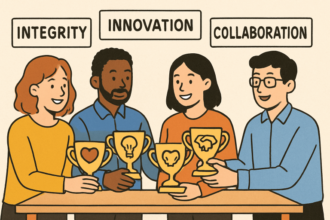How an MBA in HR Management Prepares Professionals for the Modern Workplace

Table of Contents
- 1 The Expanding Role of HR in Today’s Organizations
- 2 Essential Skills Gained in an MBA HR Program
- 3 Workplace Trends Shaping Human Resources
- 4
- 5 Building Strategic Leadership Through HR Expertise
- 6 Managing Diversity and Inclusion in the Workforce
- 7 How Technology is Transforming HR Functions
- 8 Typical Career Paths for MBA HR Management Graduates
- 9 Preparing for the Global Business Landscape
The Expanding Role of HR in Today’s Organizations
The role of Human Resources has undergone a profound transformation in recent years, emerging as a critical strategic pillar in organizations seeking competitive advantage. Gone are the days when HR was limited to hiring, payroll, and compliance; today, HR leaders help steer company vision, proactively shape organizational culture, and foster environments that embrace innovation and resilience amid constant change. As businesses strive to adapt to complex work models, demand for HR professionals armed with advanced qualifications has grown. Pursuing an MBA in HR Management is now seen as a wise investment by those wanting to lead the way in talent management and organizational effectiveness.
Companies are increasingly seeking HR professionals with an analytical mindset and leadership capabilities to address issues such as employee engagement, evolving workplace legislation, and integrating new technologies. Modern HR is central to building employer brands, managing the employee lifecycle, and ensuring workforce strategies align with business goals. HR’s growing participation in boardroom discussions fundamentally reshapes decision-making processes and drives organizational success in every sector.
Essential Skills Gained in an MBA HR Program
An MBA program specializing in HR management develops a unique blend of leadership, analytical, and interpersonal skills that sets graduates apart in the job market. Students build a solid foundation in both the theory and practice of workforce planning, employment law, compensation systems, and negotiation. These core competencies are complemented by training in data-driven human capital strategies designed to maximize organizational performance.
In addition to the technical aspects of HR, graduates hone soft skills crucial in today’s workplace, such as effective communication, coaching, and conflict resolution. They learn to scan organizational dynamics, assess the needs of diverse teams, and respond with agility to shifting business environments. Through coursework, simulations, and real-world case studies, students also master strategic thinking, emotional intelligence, and change management — all vital abilities for guiding organizations through disruption and growth. The skills acquired in these programs empower HR professionals to drive innovation, resolve challenges proactively, and support the evolving needs of modern organizations.
Workplace Trends Shaping Human Resources
Today’s workplaces are evolving faster than ever, and HR must keep pace. The rise of remote work has created new challenges for onboarding, communication, and sustaining company culture. Employees increasingly value flexibility, well-being, and meaningful connections at work. According to recent data from Gallup, more than half of U.S. employees now expect to work remotely, at least part of the time, reflecting a significant shift in workplace expectations. HR professionals are tasked with reimagining everything from training programs to engagement strategies to support a distributed, tech-enabled workforce.
These trends extend well beyond remote work. The emergence of gig work, the importance of mental health, and a renewed commitment to corporate social responsibility are shaping HR’s agenda. Successful HR leaders stay ahead of the curve by embracing innovations that foster collaboration, flexible leadership styles, and championing inclusivity. Organizations that invest in agile, adaptive HR practices respond well to these changes and position themselves as employers of choice in a competitive marketplace.
Building Strategic Leadership Through HR Expertise
Today’s HR professionals are expected to partner closely with the executive suite, guiding long-term transformation efforts and growth strategies. Strategic leadership in HR means much more than managing policies and procedures—it requires developing forward-looking talent initiatives, identifying critical skills gaps, and championing organizational agility. MBA graduates in HR management know how to design and implement scalable systems for evaluating performance, incentivizing employees, and developing high-potential leaders across business units.
Strategic HR leaders are also charged with promoting innovation and driving employee engagement at every level of the organization. Their ability to balance the workforce’s needs with the business’s objectives cements their value as trusted advisors. This often involves leveraging data analytics, benchmarking talent development programs, and fostering a culture of ongoing feedback and improvement. For organizations seeking to remain resilient, the strategic contributions of HR have never been more crucial.
Managing Diversity and Inclusion in the Workforce
An inclusive and diverse working environment has become a defining feature of forward-thinking companies. Diversity and inclusion aren’t just buzzwords—numerous studies show that companies with diverse teams consistently outperform their peers in innovation and profitability. HR professionals are primarily responsible for setting the tone, from recruiting talent from various backgrounds to designing programs that give every employee a platform to contribute. Robust diversity initiatives have been shown to drive creative problem-solving, broaden market reach, and enhance employee satisfaction.
Building and sustaining this inclusive culture requires ongoing education, clear policies, and transparent accountability systems. Organizations across industries are working to ensure diversity initiatives extend beyond checklists to become truly embedded in company values and everyday interactions. MBA programs are crucial in elevating professional standards by equipping HR leaders with the knowledge and skills necessary to effect real change.
How Technology is Transforming HR Functions
Technology adoption within HR departments has moved at breakneck speed, and the impacts are far-reaching. From applicant tracking systems and AI-powered résumé screening to cloud-based performance management tools, digital platforms are enabling better, faster decision-making. HR professionals increasingly use data analytics to uncover turnover, engagement, and productivity trends. These insights help organizations develop evidence-based strategies, reduce bias, and anticipate workforce needs before issues arise.
Integrating technology into HR functions also extends the reach of employee support programs. Virtual benefits administration, digital learning platforms, and automated feedback tools offer scalable, personalized resources that boost employee experience. By freeing HR teams from repetitive administrative tasks, technology empowers them to focus on strategic initiatives that directly impact business outcomes. Embracing these advancements is essential for efficiency and cultivating a forward-thinking, agile HR department ready to meet future challenges.
Typical Career Paths for MBA HR Management Graduates
With an MBA in HR management at Northwest Missouri State University, graduates can explore a broad spectrum of high-impact career options. HR managers are in constant demand across industries, overseeing recruitment, talent planning, benefits, and employee relations. Those passionate about problem-solving and change management often pursue consulting roles, guiding organizations through restructures or digital transformations. Compensation and benefits analysts are pivotal in designing competitive pay structures that attract and retain top talent.
Additional career paths include organizational development specialists who drive cultural transformation programs and labor relations managers who navigate complex negotiations and compliance issues. The U.S. Bureau of Labor Statistics reports that HR-related occupations are projected to grow faster than the average for all jobs through 2032, making this field both stable and full of opportunity. Ambitious graduates may also seek executive positions, such as Chief Human Resources Officer, after gaining several years of experience in progressive leadership roles.
Preparing for the Global Business Landscape
HR managers face new and complex challenges as organizations expand across borders and tap into global markets. Success on the international stage requires deep knowledge of employment laws, benefit structures, and cultural attitudes that vary from country to country. HR leaders must be adept at supporting a multicultural workforce, addressing language barriers, and designing equitable policies that resonate with employees worldwide.
Organizations often rely on their HR teams to guide cross-border collaboration, manage international assignments, and develop strategies for attracting talent globally. MBA programs geared toward HR management prepare graduates to handle this complexity confidently, blending adaptability, critical thinking, and cultural intelligence. The result is a generation of HR leaders ready to help their organizations thrive no matter where business takes them.







